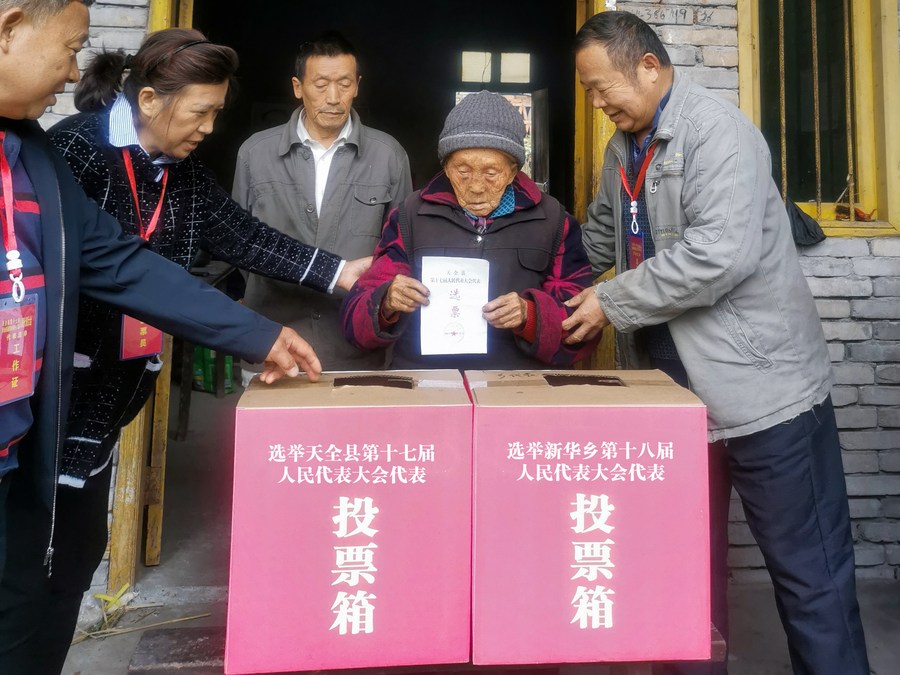
Li Chaolan, a centenarian hailing from a mountain village in southwest China, has voted in the local people's congress elections over a dozen times. She hopes people attending the ongoing national "two sessions" in Beijing will pay more attention to rural old-age care.
Meanwhile, teahouses in Linhuan, east China's Anhui Province, are bustling with locals, as they gather to discuss the significant political event, looking for opportunities of development for the ancient town.
These stories offer a glimpse of how citizens in China, accounting for one-fifth of the world's population, take part in the country's genuine and effective democratic practice.
The ongoing sessions of the National People's Congress (NPC) and the National Committee of the Chinese People's Political Consultative Conference (CPPCC) bear the mission to respond to the aspirations of the 1.4 billion Chinese people and bring them together to forge ahead.
China's whole-process people's democracy, which covers elections, consultations, decision-making, management and oversight, ensures that it is the people who are running the country.
VOTING WITH A CORN KERNEL
Li Chaolan, from Ya'an City in Sichuan Province, recalls her first-ever experience of taking part in elections of deputies to people's congresses.
"It was in the winter of 1953. We lined up and each cast a corn kernel as a ballot for our favorite candidate," she said. "I was so excited that day that I barely slept."
In September 1954, the first session of the first NPC was convened, establishing a system of people's congresses as China's fundamental political system.
As of the end of 2020, China had 2.62 million deputies to people's congresses at all five levels. Of the total, 94.5 percent were from the county and township levels, all directly elected on a one-person-one-vote basis. Deputies to people's congresses at the city, provincial and national levels are elected by people's congresses at the next level below.
Last October, Li Chaolan put the ballots once again into the mobile ballot boxes carried by the election staff to her door as more than 1 billion voters began to participate in a new round of elections to people's congresses at the township and county levels.

"Every time a new term was about to begin, I was given a voter's card and ballots," Li said, expressing her pride at the fact that each ballot, including hers, counts.
From corn kernels to mobile ballot boxes, the times have changed, but the essence of people being the masters of their own country has not.
Since the initiation of reform and opening up in the late 1970s, the voter turnout rate for elections of deputies to people's congresses at county and township levels has stayed at around 90 percent, far higher than that in local elections in many Western countries.
China's deputies to people's congresses do not work as full-time lawmakers but have their own jobs and careers. They come from all regions, ethnic groups, sectors and social groups. Even the ethnic group with the smallest population has at least one deputy to the NPC.
Democracy is not a decorative ornament, but a means of solving problems.
Proposals and suggestions put forward by national legislators and political advisors during last year's "two sessions" have prompted the formulation of more than 1,600 government policies and measures.
Among them, proposals on better protecting laborers' rights in the new economy, such as food-delivery and car-hailing industries, have been embodied in a government guideline released in July 2021.
"The basic interests of ordinary people in China are represented in government to a far greater degree than the case in the West," said Carlos Martinez, a British author and political commentator.
According to the 2022 Edelman Trust Barometer, trust among Chinese citizens in their government in 2021 was 91 percent, ranking first among the 28 countries surveyed. The figure is consistent with the findings of a Harvard Kennedy School survey.